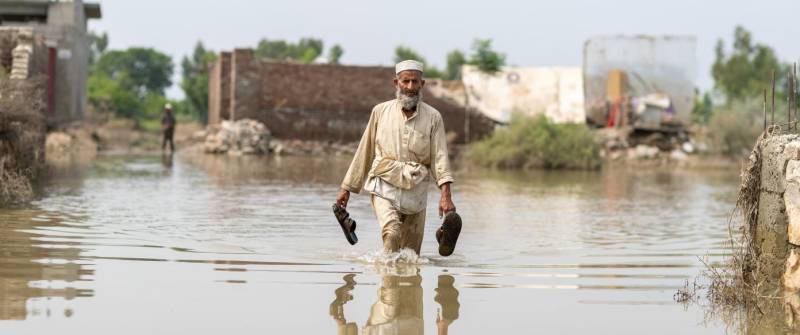
Almost five months after massive flooding and unanticipated rainfall drowned large swathes of Pakistan, the country is still grappling with the aftermath. Millions remain homeless, displaced as refugees in their own land, as children are at risk of water-borne diseases and destruction of hectares of farmland has wreaked havoc on the agricultural sector as well as food markets.
Suffering the worst floods in living memory, whole villages across Pakistan were swept away in the devastating floods of August 2022. As the country suffers from political instability and economic crises, its government has not given the required attention to rehabilitating millions of affected families. Four months on, this has resulted in reports of starvation and outbreaks of disease among those displaced by the floods, who are now homeless.
Heavier than expected monsoon rainfall, which was estimate at over five to six times the usual volume, and the country's decrepit infrastructure - despite multiple disasters in the past decade, and an ongoing multi-billion dollar Chinese economic corridor - caused millions to flee their homes in August last year.
The floods have also devastated the country's agriculture sector, which is the backbone of the national economy and employs most of the rural labour. Retail food markets are reporting record price increases nearly every fortnight, as supply shocks and hoarding led to chaotic scenes at food distribution centres some weeks ago.
The floodwaters have yet to recede in many areas, even as affectees attempt to return to their homes - or whatever is left. Desperate families are making appeals to strangers on social media, and the charitable public is making donations directly to the affectees on a trust-and-vouch basis.
Many are convinced that, despite heavy funding after the 2005 earthquake and previous floods in 2011, any more aid to Pakistan for 'relief and disaster recovery' will also be squandered by the elite. But this has not deterred those interested in helping out: donations are going directly to local aid groups or affected families, and their recovery and rehabilitation can of course be monitored, to ensure the donations are spent on what they are meant for.
The United Nations recently co-hosted a climate change conference with Pakistan, to help the financially beleaguered country raise donations for the rehabilitation of affected families and infrastructure. Pledges of $10 billion were secured at the conference, but these and other financial commitments - including from the US, China, Saudi Arabia, UAE and others - made to the government of Pakistan have yet to materialise.
As floods now affect Australia and New Zealand on an unprecedented scale, it must be noted that the experience of Pakistan in late 2022 is a 'sign of things to come' for the rest of the world. The world must focus on disaster recovery and climate resilience, until governments and corporations can agree to actually start limiting the harmful impact of human activity on the natural environment.
Suffering the worst floods in living memory, whole villages across Pakistan were swept away in the devastating floods of August 2022. As the country suffers from political instability and economic crises, its government has not given the required attention to rehabilitating millions of affected families. Four months on, this has resulted in reports of starvation and outbreaks of disease among those displaced by the floods, who are now homeless.
Heavier than expected monsoon rainfall, which was estimate at over five to six times the usual volume, and the country's decrepit infrastructure - despite multiple disasters in the past decade, and an ongoing multi-billion dollar Chinese economic corridor - caused millions to flee their homes in August last year.
The floods have also devastated the country's agriculture sector, which is the backbone of the national economy and employs most of the rural labour. Retail food markets are reporting record price increases nearly every fortnight, as supply shocks and hoarding led to chaotic scenes at food distribution centres some weeks ago.
The floodwaters have yet to recede in many areas, even as affectees attempt to return to their homes - or whatever is left. Desperate families are making appeals to strangers on social media, and the charitable public is making donations directly to the affectees on a trust-and-vouch basis.
Many are convinced that, despite heavy funding after the 2005 earthquake and previous floods in 2011, any more aid to Pakistan for 'relief and disaster recovery' will also be squandered by the elite. But this has not deterred those interested in helping out: donations are going directly to local aid groups or affected families, and their recovery and rehabilitation can of course be monitored, to ensure the donations are spent on what they are meant for.
The United Nations recently co-hosted a climate change conference with Pakistan, to help the financially beleaguered country raise donations for the rehabilitation of affected families and infrastructure. Pledges of $10 billion were secured at the conference, but these and other financial commitments - including from the US, China, Saudi Arabia, UAE and others - made to the government of Pakistan have yet to materialise.
As floods now affect Australia and New Zealand on an unprecedented scale, it must be noted that the experience of Pakistan in late 2022 is a 'sign of things to come' for the rest of the world. The world must focus on disaster recovery and climate resilience, until governments and corporations can agree to actually start limiting the harmful impact of human activity on the natural environment.

